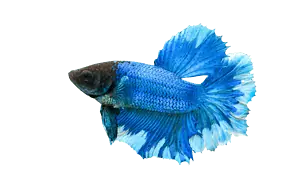Have you ever gazed into a mirror and wondered what your betta fish might think when it sees its own reflection? You’re not alone!
Many betta owners share this curiosity, and today, we’ll dive into the fascinating world of betta reflections.
But be warned – it’s not all fun and games, as we’ll uncover both the benefits and risks of using a mirror with your betta friend.
Ready to become a betta-reflection expert and learn how to do it safely and responsibly? Let’s dive in and unravel this fishy mystery together!
Key Takeaways
- Mirrors provide good stimulation and engage your bettas actively.
- Some bettas are triggered by reflection, so limiting their exposure is critical.
- Betta mirrors are great to provide your fish, but you need to monitor them for signs of stress if they don’t respond well.

Table of Contents
How Do Betta Fish React to Mirrors?
Natural Instincts and Personality of Betta Fish
Betta fish are territorial by nature, and their aggressive tendencies serve as a defense mechanism against potential rivals.
When confronted with a mirror, a betta may perceive its reflection as another betta fish encroaching on its territory.
This can lead to various reactions, from flaring their gills to assert dominance to attempting to chase the “intruder” away.
Female betta fish are less likely to have this issue, but it’s still possible for them to get triggered.
Betta Fish Reactions to Mirrors: Flaring, Chasing, Hiding, or Ignoring
Every betta fish is unique, and their reaction to a mirror can vary based on factors such as age, gender, temperament, tank size, and natural environment.
Let’s dive into some common reactions you might observe:
- Flaring: A sign of aggression or excitement, flaring occurs when a betta fish puffs out its gills and spreads its fins wide to appear more intimidating. This display is often accompanied by a vibrant coloration, making it quite a sight to behold.
- Chasing: Some bettas are more proactive in defending their territory. They might attempt to chase their reflection, swimming rapidly toward the mirror and even bumping into it in an effort to drive away the perceived threat.
- Hiding: On the other hand, a more timid betta may opt to hide when faced with its reflection, seeking refuge behind plants, decorations, or other hiding spots within the tank.
- Ignoring: Interestingly, some bettas may not react at all to their reflection, choosing instead to focus on other aspects of their environment, like exploring their tank or nibbling at a tasty morsel.
As a betta fish owner, it’s essential to understand your fish’s unique personality and monitor its reaction to a mirror.
While brief exposure to a mirror can serve as an engaging form of stimulation, prolonged exposure may lead to stress and exhaustion.
Keep an eye on your betta’s behavior, and adjust their environment accordingly to ensure a happy and healthy fish.
Insights from Betta Owners on Reddit
Betta owners on Reddit have shared a range of experiences with mirrors and their fish. Let’s dive into some of these insights to better understand the relationship between bettas and mirrors:
Some bettas enjoy flaring at mirrors occasionally, while others lose interest or become stressed
For some bettas, occasional flaring in front of a mirror may be exciting exercise and enrichment.
However, it’s essential to keep a watchful eye on your fish for signs of stress, such as rapid breathing or torn fins. Excessive flaring can lead to injuries or heightened aggression.
Betta fish are unique individuals, and their reactions to mirrors can vary significantly. While some may flare occasionally, others might do so constantly or not at all.
\It’s crucial to observe your betta’s behavior and adjust mirror exposure accordingly, ensuring a healthy and happy fish.
Some bettas ignore mirrors completely, focusing on other elements in their tank
If your betta fish isn’t interested in its reflection, it may be content and confident in its environment, or it could be focusing on other aspects of its tank.
On the other hand, mirror disinterest could also signal boredom or depression. Providing a variety of plants, toys, and hiding spots can help keep your betta stimulated and happy.
By observing your fish’s behavior, you’ll determine if additional enrichment is needed to keep your betta engaged and thriving.
Remember, each betta is unique, and their needs may change over time. Stay attentive to their behavior and make adjustments as necessary.
What Are the Benefits of Giving Your Betta Fish a Mirror?

Mirrors can provide mental and physical stimulation, improving your betta fish’s well-being.
Let’s dive into some of the positive effects of mirrors on betta fish, such as enhancing brain function, boosting color vibrancy, and even warding off depression.
Boosting Brain Function
Did you know mirrors can challenge your betta’s cognitive abilities and memory?
Introducing a mirror to your betta’s environment can help keep their minds sharp and prevent boredom. Think of it as a puzzle which keeps their tiny brains engaged and active.
It’s almost like these are little betta exercise mirrors.
Amplifying Color Vibrancy
Mirrors also work wonders for your betta’s appearance.
When a betta sees its reflection, it triggers natural hormones and activates pigment cells, making its colors more vibrant and attractive.
It’s like turning up the saturation on your favorite Instagram filter! If you’re a betta fish keeper who’s into photography, capturing your betta’s enhanced colors could make for some stunning before-and-after shots.
Warding Off Depression
Lastly, mirrors can provide your betta with a sense of companionship and social interaction, which is crucial for preventing loneliness and isolation.
A fellow betta fish enthusiast on Reddit shared their experience, saying:
“I 100% love mirrors. My little Mingo gets super depressed if I don’t remember to float his mirror in there with him. I only do this about once a week. Once I start to notice he seems lonely, I float the mirror for 10 to 15 minutes, and he’s back to being cheery again.”
Reddit
So, if your betta seems a bit down, consider introducing a mirror to brighten their spirits and add some extra pep to their swim.
What Are the Risks of Giving Your Betta Fish a Mirror?

Understanding the potential risks associated with using mirrors in your betta fish tank is crucial for your fish’s well-being.
Causing Injury
The primary risk of using mirrors is the possibility of causing physical injury to your betta fish.
When a betta fish sees its reflection, it may perceive it as a rival and attack aggressively.
This reaction can lead to your betta fish colliding with the glass or biting its own fins, resulting in injury.
To avoid this risk, consider using a soft or flexible mirror designed specifically for fish tanks.
These mirrors are less likely to cause harm if your betta fish bumps into them.
Additionally, keep a close eye on your fish’s behavior and check for signs of injury regularly. If you notice any injuries or excessive aggression, it may be best to remove the mirror from the tank.
Increasing Aggression
Another risk of using mirrors is the increased aggression of betta fish.
A fish exposed to its reflection may become more hostile and territorial, affecting its relationship with other tank mates or even its human caretakers.
This heightened aggression can lead to stress, which may negatively impact your betta fish’s overall well-being.
To reduce this risk, limit your betta fish’s exposure time to the mirror to avoid unnecessary stress. Do this by only introducing the mirror for short periods, such as 15 minutes per day, or on specific days, like once or twice a week.
Additionally, ensure your betta fish has plenty of hiding places in its tank, so it feels secure and can retreat when necessary.
Overstimulating Your Betta
Lastly, mirrors can overstimulate your betta fish, causing excitement or stress that affects its normal behavior and sleep cycle.
Just like humans, betta fish need their rest, and an overstimulated fish may not get the proper amount of sleep it needs to stay healthy.
To balance this risk, only use a mirror occasionally or during specific times of the day. For example, you might introduce the mirror in the morning when your betta fish is most active and remove it in the evening to allow your fish to rest.
Monitor your betta’s response to the mirror and adjust its exposure accordingly to ensure a happy and healthy fish.
How to Choose the Right Mirror for Your Betta Fish
Selecting the perfect mirror for your betta fish is a fun yet important decision.
Opting for a soft or flexible mirror is your best bet, as it won’t injure your betta or damage the tank.
Pet stores and online retailers offer a wide range of options, so take your time exploring the choices and find the one suiting your betta buddy best.
Placing the Mirror in Your Betta Fish Tank
Deciding where to place the mirror – inside or outside the tank – depends on your preferences and what’s most convenient for you.
Regardless of your choice, make sure the mirror is securely positioned and won’t pose any risks to your betta fish or their environment.
Limiting Your Betta’s Exposure to the Mirror
To prevent stress or overstimulation, it’s crucial to limit your betta’s exposure to the mirror. Aim for 5 to 10 minutes per day or every other day, allowing your fish ample time to relax and recover between mirror sessions.
Tips and Warnings from Reddit Users

Monitor Your Betta’s Reaction and Behavior
Fellow betta enthusiasts on Reddit recommend closely watching your betta’s reaction and behavior when introducing a mirror.
If you observe signs of stress, injury, or aggression, it’s best to adjust or discontinue using the mirror altogether.
Keep an eye out for stress indicators like clamped fins, faded colors, loss of appetite, or disease symptoms. Injuries may manifest as torn fins, damaged scales or gills, or bleeding wounds.
Aggressive behavior can include attacking other tank mates or humans or destroying plants and decorations.
Opt for a Mirror with a Suction Cup
Another helpful tip from Reddit users is selecting a mirror with a suction cup for easy attachment and removal from the tank wall.
This type of mirror is a safer and more convenient option compared to hand-held or floating mirrors. A suction cup mirror allows you to vary the stimulation and challenge for your betta by placing it at different heights and angles.
Plus, it’s easily removable when not in use, preventing your betta from becoming too accustomed to or bored by the mirror.
Adjusting Mirror Use and Helping Your Betta Recover
If you’ve determined your betta fish is stressed or unhappy with the mirror, it’s crucial to make adjustments for their well-being.
Here’s how to help your betta recover and get back to feeling their best:
Remove the mirror:
The first step is to remove the source of stress. Take the mirror out of the tank and observe your betta’s behavior to see if it improves.
You might notice your betta swimming more calmly and displaying less aggressive behavior once the mirror is gone.
Reduce exposure time:
If you’d like to continue using a mirror for short periods, limit the exposure time to a few minutes per day.
This way, your betta can still interact with its reflection without becoming overly stressed. You could even set a timer to ensure you don’t accidentally leave the mirror in for too long.
Provide a stress-free environment:
Make sure your betta’s tank is clean, well-maintained, and has plenty of hiding spots, such as caves or plants.
This will help your fish feel more secure and reduce stress levels.
Additionally, ensure the water temperature and pH levels are within the appropriate range for betta fish, as fluctuations also cause stress.
Offer high-quality food:
Feeding your betta a balanced diet with high-quality pellets or flakes can help improve its overall health and reduce stress.
You might also consider offering live or frozen foods, such as brine shrimp or bloodworms, as occasional treats to keep your betta engaged and stimulated.
Monitor your betta closely:
Keep an eye on your betta’s behavior and appearance to ensure it’s recovering from the stress. If symptoms persist or worsen, consult a veterinarian or fish care expert for advice.
Don’t hesitate to reach out for help, as betta fish are sensitive creatures, and addressing stress early on can prevent more serious health issues down the line.
Alternative Toys for Betta Fish Entertainment

Mirrors, while entertaining for a short time, aren’t the only option for betta fish amusement.
In this section, we’ll dive into some alternative toys which will keep your betta fish engaged and happy.
Ping Pong Balls: Bouncing Fun for Your Betta
Ping pong balls make for a simple yet effective toy to captivate your betta fish.
These lightweight balls float on the water’s surface and move with the current, sparking curiosity in your betta.
To introduce ping pong balls to your betta’s tank, gently drop one or two balls into the water, allowing your fish time to investigate.
Engaging with your betta using ping pong balls is both easy and enjoyable. Tap the balls lightly to make them bounce or roll, or use your finger or a stick to move them about.
Your betta will be fascinated by the movement and may even chase the balls, giving them much-needed exercise and mental stimulation.
Hoops: A Challenge for Your Betta’s Swimming Skills
Hoop training offers a unique and engaging way to challenge your betta fish’s swimming abilities and intelligence. As your fish masters swim through hoops, they’ll feel a sense of accomplishment and reward.
To get started, use plastic or silicone hoops large enough for your betta to swim through comfortably.
Attach the hoops to the tank wall or a suction cup to keep them in place. Train your betta using treats and positive reinforcement to encourage them through the hoops.
As your fish becomes more adept at navigating the hoops, increase the difficulty and number of hoops for an added challenge.
Catappa Leaves: Natural Comfort and Enrichment
Catappa leaves, also known as Indian almond leaves, provide a natural and beneficial addition to your betta fish’s environment.
These leaves offer comfort, enrichment, and improved health and water quality for your fish.
To introduce catappa leaves to your betta’s tank, rinse them thoroughly and soak them in water until they sink.
Add one or two leaves per gallon of water, ensuring they’re spread out and accessible for your betta.
Catappa leaves offer numerous benefits for your betta fish.
They create a soft and cozy resting place, release tannins lowering the pH, help prevent fungal infections, and stimulate natural behaviors like building bubble nests.
This all-natural solution is enjoyable and beneficial for your betta fish’s overall well-being.
To Mirror or Not To Mirror
Betta fish can indeed benefit from occasional interaction with a mirror.
However, as responsible betta fish owners, it’s crucial to adopt a balanced approach to mirror usage. Remember, moderation is key.
By closely observing our bettas and using mirrors sparingly, we can provide them with a stimulating environment without causing undue stress or harm.
Check out these other betta toys we love for our tanks.


